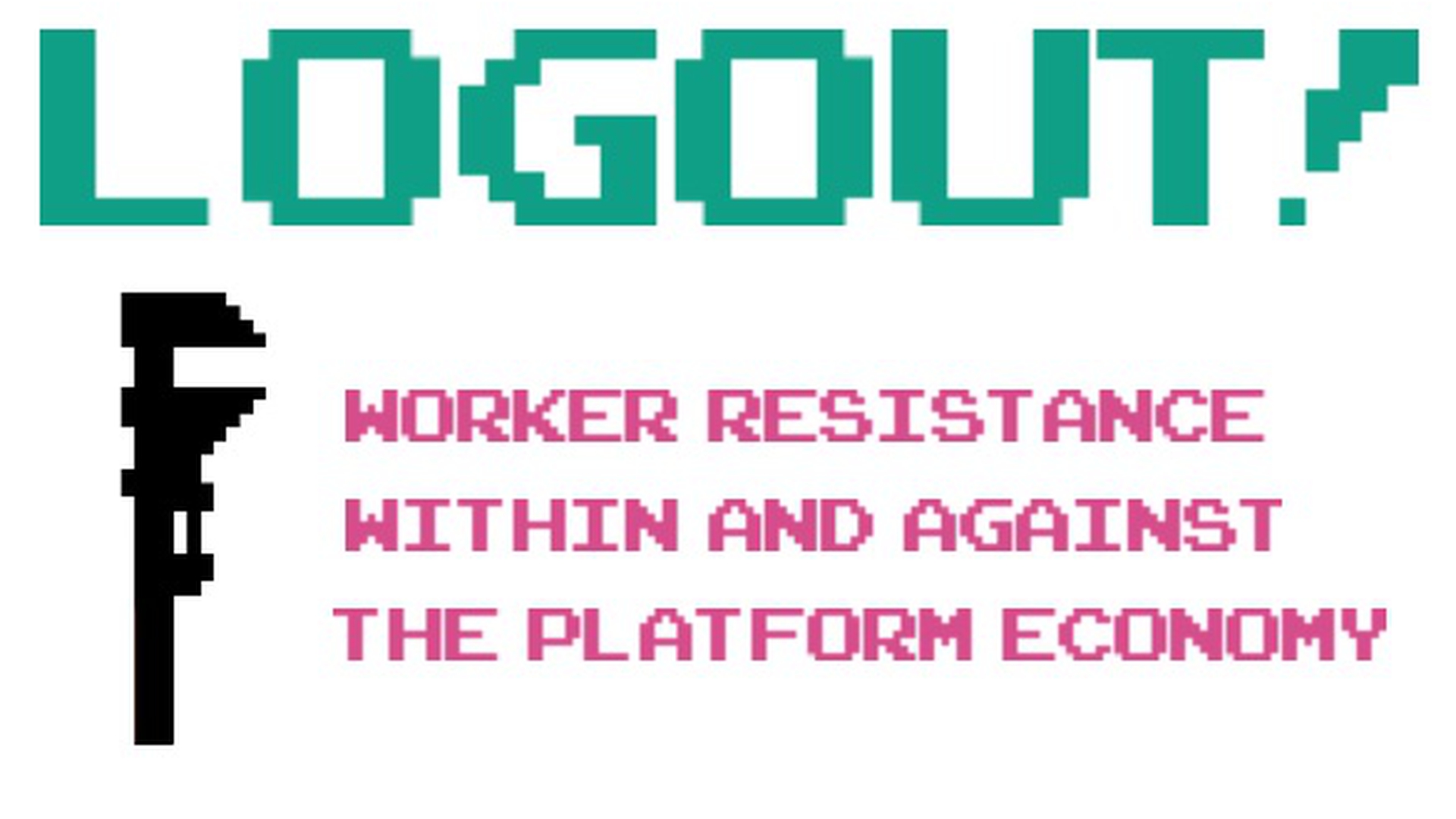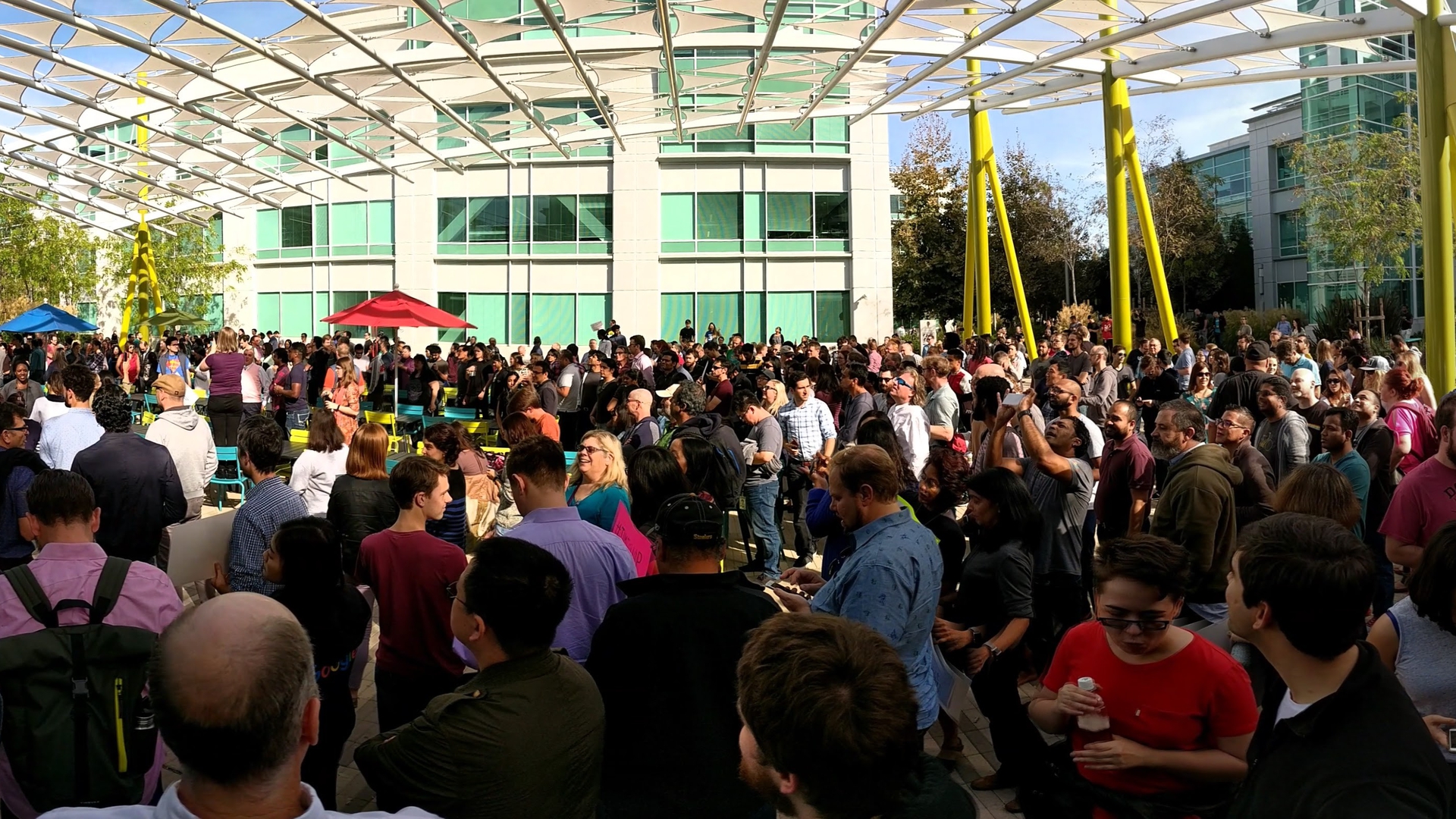Log Out! The Platform Economy and Worker Resistance
by
Alessandro Delfanti (@adelfanti),
Sarah Sharma (@sarahrsharma)
June 8, 2019
Featured in Logout! (#8)
Editorial

inquiry
Log Out! The Platform Economy and Worker Resistance
Editorial
Shop floors have always been defined by the ways workers calibrate their bodies’ movements, mealtimes, and hours of work to the demands of their employers but also to the logics of the machines used for production. The introduction of new computing technology over the past few decades has gone hand in hand with the increasing casualization of labour and the inclusion of new masses of workers in capitalist production. Yet, like shop floor workers bygone or elsewhere, these workers are not just passively adapting to such transformations, or merely syncing up with the machines. From Shenzen to Silicon Valley, from the Foxconn employees who produce digital gadgets to the Foodora riders of the app-based economy, workers actively challenge the technological demands of digital platforms. They unionize and organize for improved conditions, higher wages, more predictable scheduling, more adequate benefits, as well as against managerial despotism and workplace discrimination. Moreover, today’s digital shop floor has new shops and new forms of work, from Turkers in online platforms to Uber driver’s swiping through traffic and Insta-influencers struggling with social media logics. All of them both buffer and reload the accelerated circuits of capitalism.
In March 2018 we organized a public symposium at the University of Toronto, titled Log Out!. We brought together researchers, worker collectives, and organizers in order to capture the emergence and consolidation of a cycle of struggles within and against the platform economy. We wanted to capture the struggles born inside the belly of this digital beast while refusing it the power of being inevitable or absolute. For one, we focused on a range of historical and political contexts in order to present the current and local cycles of struggle as moments in a longer history of worker mobilizations in the technology and service industries since at least the 1980s. Secondly, we were insistent that in order to better understand the contemporary politics of digital labour we had to highlight the exhausted yet resistant labour force. Worker organization and counteraction unveils better than anything else the disruptive nature of the seemingly smooth forces of capitalism and technological evolution. Log Out! was set in the university but with the imperative that active collaboration was not going to break down the silos between researchers and workers.
This special issue accounts for the day we spent together in 2018. Some of the themes discussed at the conference have already made their way to Notes from Below. For example the opportunities and challenges posed by class composition at Amazon warehouses, or the emergence of new forms of workers’ inquiry in the American tech industry. In this special issue we gather all first person accounts and research presented at Log Out! on the myriad of ways in which workers resist to and reject the tumultuous changes generated by the current re-organization of labour via the platform economy. We also include a few invited articles that allow us to expand and consolidate the picture we painted in Toronto. Still, this special issue covers only a limited range of themes and stories in a dynamic moment for workers’ organizing and struggle in the platform economy. We are not done though: stay tuned for a second Log Out! conference in 2020. We hope that this material will contribute to understanding and fostering the key role of worker refusal, organizing and struggle in future processes of liberation.
Contextualizing the present
In The end of the beginning, Callum Cant and Jamie Woodcock discuss the rapid stabilization of international struggles within digital work. They argue that the period of “emergence” of class struggle in platform capitalism is coming to a close, and that we should expect to witness the sedimentation of traditional forms of worker solidarity, institutional forms of unionization, and social recomposition.
Workers resisted the capitalist use of computing since its inception. With his political history of the seminal Bay Area magazine Processed World, Chris Carlsson offers a glimpse at the ways in which the transformation of office work in the 1980s was contested and resisted by workers such as programmers, call center operators, and file clerks. It is a visual history, as the article is dotted by the iconic and ironic design that characterised the magazine.
In the last decade, worker responses to the power of digital capitalism have followed its global expansion and its extension to new industries. In From the computers to the streets, Julian Posada offers eleven stories of worker struggles from this recent global wave of mobilization, ranging from Amazon to video games and from China to the United States.
Organizing digital labour
As workers in many platform-based gig economies mobilize, this happens unevenly across different platforms and sectors. In his On the conditions of possibility for worker organizing, Niels van Doorn reflects on the legal, social, and technical factors that influence the organization of worker struggle, including labor fragmentation, workers’ legal status, and nature of the work performed.
In Looking back, the Tech Worker Coalition updates its analysis of recent mobilizations in the American tech industry, such as the struggles that culminated in worker walk-outs denouncing workplace discrimination and sexual harassment at Google and beyond. This is linked to TWC’s reflections on the use of workers’ inquiry as a tool to raise class consciousness and build solidarity.
The necessity to coalize workers across the boundaries generated by division of labour is at the center of Tamara Kneese’s Precarity beyond the gig. Emerging alliances between engineers, contractors, and gig workers in the campuses of the Bay Area’s tech industry mirror what happens in universities, where adjunct professors, grad students and service workers have created forms of cross-class solidarity.
(Re)appropriating digital tools
In Platform organizing, Enda Brophy and Seamus Bright Grayer present emerging digital platforms as tools for labour organizing in the gig economy and beyond. These include corporate services that are tactically appropriated by workers, as well as horizontal worker-to-worker digital communication channels developed to generate worker power.
The tactical use of digital communication platforms is at the center of Nicole Cohen and Greig de Peuter’s Write, post, unionize. The article presents a movement of self-organization among journalists in North American digital newsrooms, ranging from Vice to Vox. The direct involvement of young digital journalists in highly public unionization drives counters ideas about generational aversion to labour unions.
Instagram is the site of a unique and ongoing struggle between influencers and the platform, argues Victoria O’Meara. In The threat the bot brings, she describes how influencers’ use of tools for the automation of engagement produces clashes about the proper way to foster interaction with the content produced by users. Bots are problematic to the platform, which feeds on data about ‘authentic’ human behaviour.
Subverting the platform
Rianka Singh’s piece reports on and extends the conference’s final roundtable. In Checking in on Log Out!, Nick Dyer-Witheford, Alessandro Gandini, Lilly Irani, and Kristy Milland reflect on the contested nature of digital worker resistance. If we are to subvert platform labour, we need not only to nurture the current cycle of struggles, but also to change the pace and patterns of life under digital capitalism.
Log Out! was sponsored and organized by the University of Toronto’s McLuhan Centre for Culture and Technology through a working group composed of Madison Trusolino, Rianka Singh, David Nieborg, Alessandro Delfanti, Brett Caraway, and Nicole Cohen. We would like to thank Lauren Ash, Eden Rusnell, Sarah Wilkins, and all the other people who made Log Out! possible.
Featured in Logout! (#8)
Subscribe to Notes from Below
Subscribe now to Notes from Below, and get our print issues sent to your front door three times a year. For every subscriber, we’re also able to print a load of free copies to hand out in workplaces, neighbourhoods, prisons and picket lines. Can you subscribe now and support us in spreading Marxist ideas in the workplace?
Read next

Amazon Is the New FIAT
by
Alessandro Delfanti
/
Aug. 16, 2018

